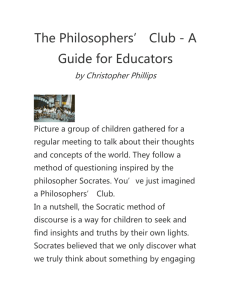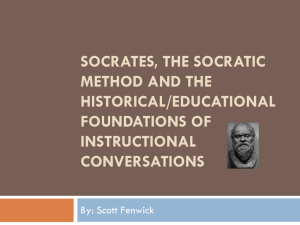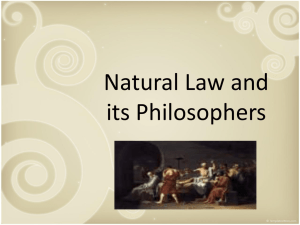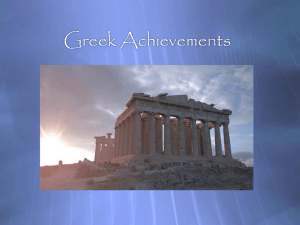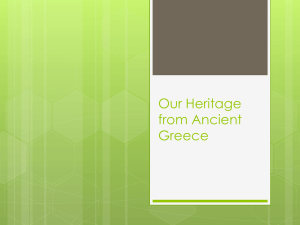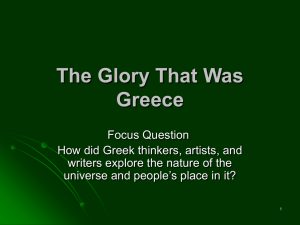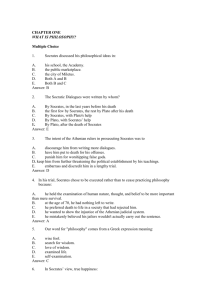lesson 6
advertisement
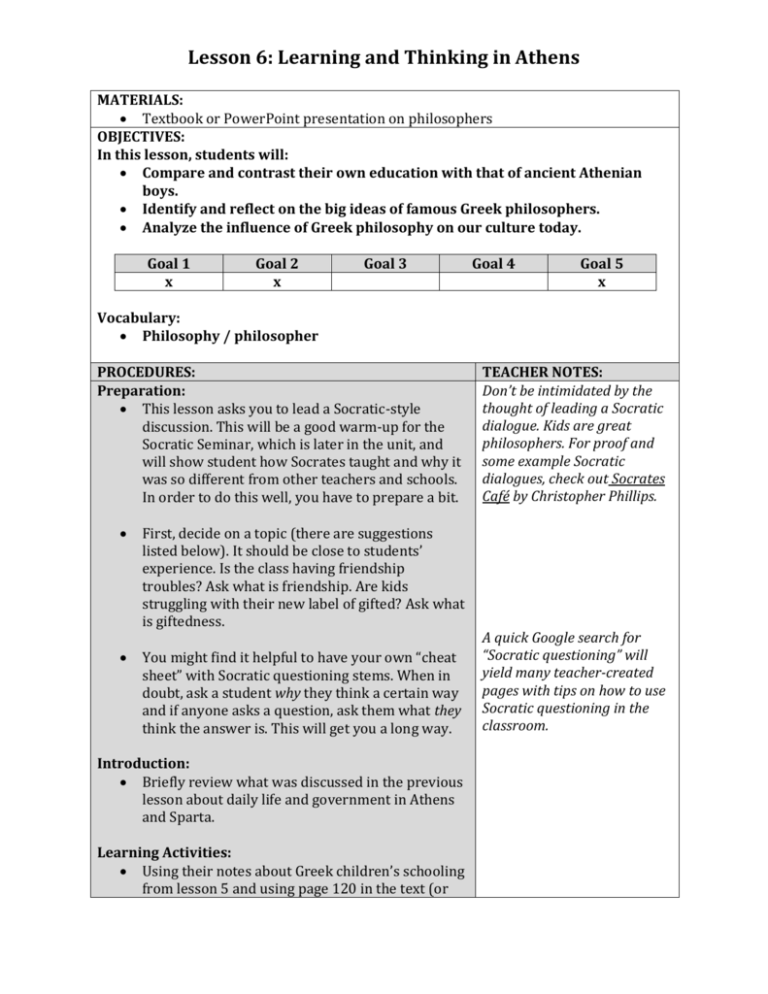
Lesson 6: Learning and Thinking in Athens MATERIALS: Textbook or PowerPoint presentation on philosophers OBJECTIVES: In this lesson, students will: Compare and contrast their own education with that of ancient Athenian boys. Identify and reflect on the big ideas of famous Greek philosophers. Analyze the influence of Greek philosophy on our culture today. Goal 1 x Goal 2 x Goal 3 Goal 4 Goal 5 x Vocabulary: Philosophy / philosopher PROCEDURES: Preparation: This lesson asks you to lead a Socratic-style discussion. This will be a good warm-up for the Socratic Seminar, which is later in the unit, and will show student how Socrates taught and why it was so different from other teachers and schools. In order to do this well, you have to prepare a bit. First, decide on a topic (there are suggestions listed below). It should be close to students’ experience. Is the class having friendship troubles? Ask what is friendship. Are kids struggling with their new label of gifted? Ask what is giftedness. You might find it helpful to have your own “cheat sheet” with Socratic questioning stems. When in doubt, ask a student why they think a certain way and if anyone asks a question, ask them what they think the answer is. This will get you a long way. Introduction: Briefly review what was discussed in the previous lesson about daily life and government in Athens and Sparta. Learning Activities: Using their notes about Greek children’s schooling from lesson 5 and using page 120 in the text (or TEACHER NOTES: Don’t be intimidated by the thought of leading a Socratic dialogue. Kids are great philosophers. For proof and some example Socratic dialogues, check out Socrates Café by Christopher Phillips. A quick Google search for “Socratic questioning” will yield many teacher-created pages with tips on how to use Socratic questioning in the classroom. Lesson 6: Learning and Thinking in Athens another source about ancient Greek education) as a reference, have students create Venn diagrams comparing and contrasting Athenian educational practices with Spartan ones. Ask the class to guess which polis produced the most famous thinkers: Athens or Sparta. Encourage students to support their answers with facts. Explain that some of the most famous thinkers in history were Athenians. Ask: what was it about Athenian culture as opposed to Spartan culture that influenced its citizens to think about and discuss big ideas? (less militaristic society, more emphasis on the individual) Ask students to quietly gather on the floor, close their eyes, and visualize sitting in the Athenian agora. Say something like: You are sitting outdoors under a long colonnade with all the hustle and bustle of the marketplace all around you. You can hear the sound of vendors selling grain, olive oil, wine, figs, and produced goods such as pottery and cloth. You can smell the incense burning in the temples of Hephaestus, the god of craftsmen, Aphrodite, the goddess of love, and Hermes, the messenger god. You see people going in and out of the tall, marble temples, the law court, and the mint where they produce all of Athens’ coins. There are people all around you going about their daily business: shopping, working, or worshipping at the temples, but you are seated here under this colonnade to listen to the famous teacher and thinker named Socrates speak. And as you open your eyes I want you to imagine that it is Socrates that is asking you, “What is wisdom?” (or learning or friendship or giftedness or any other topic pertinent to this group of kids. The closer to their experience, the better. ) Lead students in a Socratic discussion. You can let this go on for as long as you’d like. Socratic discussions tend to end with more questions than answers; so don’t worry about ending things Grouping Tip: Making the Venn diagram could easily be an individual, small group, or whole-group activity. Having kids change locations (from desks to floor) for the visualization and subsequent discussion makes it seem different and special. It also gives kids a chance to move. Lesson 6: Learning and Thinking in Athens without a neat conclusion. The idea here is for students to get a taste of what made Socrates and his teaching style so special. As students return to their seats, Ask: What did you think about that discussion? How was Socrates’ way of teaching different than other teachers? Explain that Socrates met with people all the time and had those kinds of discussions. He believed that wisdom was the greatest thing someone could have and that any wrong people did was because of their ignorance. Therefore, if people could become wise they would also become good, because they would know the right things to do. Socrates and people like him were called (and are still called) philosophers, which in Greek literally means lovers of wisdom. To further expand on Socrates, Plato, and Aristotle, you could either have students look at pages 133-134 in the text or put together a brief PowerPoint with information about each philosopher (there are some ready-made PowerPoints that you could modify on Mr. Donn’s history page, which is listed in the Resource section of this unit.) Key ideas: Socratic method and Socrates’ influence on Plato, Plato’s theory of forms, Plato’s influence on Aristotle, Aristotle’s contributions to Science and the idea of the philosopher-scientist Take some time to have students think about and discuss these philosophers’ ideas. It’s more important for students to wrestle with some of these ideas than memorize them. Closure: Ask students to reflect on the ways in which the concept of influence is seen here. (i.e. beginning the field of philosophy, the way they influenced each other, the aspects of government influence in Socrates’ death, etc.) What generalizations do Lesson 6: Learning and Thinking in Athens these observations support? Extensions: This list of three philosophers just scratches the surface of Greek philosophers and philosopherscientists. The whole class or individual students could study Hippocrates, Pythagoras, Archimedes, Anaxagoras, Aristotle, etc. Some of these men are in the textbook, but information about all of them is easily available online and in children’s books about ancient Greece. Invite a philosophy professor from a local college or university to come in and speak to the class about what a philosopher does. This person could speak to the influence that these three philosophers had on the philosophy in general as well. Some students may want to start a philosopher’s club, in which they meet to have philosophical discussions on various topics. This could happen during the school day (perhaps a brown bag lunch club) or after school. Alexander the Great was deeply influenced by his teacher, Aristotle. Have students research this relationship and the influence it had on Alexander’s life and on the later spread of Hellenistic culture. Homework: DD: philosophy Other HW options: Which philosopher do you think was the most important or influential? Write a paragraph with reasons to support your argument. Do you think you’d like to have Socrates, Plato, or Aristotle for a teacher? Write a paragraph with reasons supporting your choice. Philosophers wonder about all kinds of things. What do you wonder about? Write down some Questions kids come up with can be the basis of later Socratic discussions. Students can vote on what they’d like Lesson 6: Learning and Thinking in Athens questions you wonder about in your notebook and bring them to class tomorrow. to discuss or you could choose.

